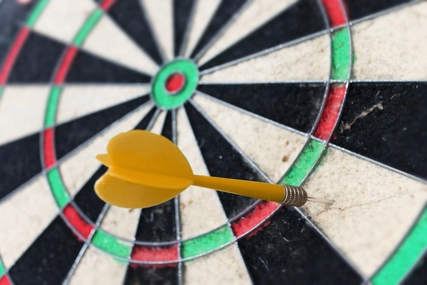20+ Goal Achievement Hacks You Wish You Knew Earlier

Have you ever felt like there are too many paths to achieve your goal and feel overwhelmed? Or can’t you focus to work every day for what you want to achieve?
In this article, I’m going to show you some goal achievement practices, and knowledge, and I will give you many strategies so you can achieve your goals ASAP.
List Of Content:
What Is Goal Achievement?
Goal achievement is the art of transforming your aspirations into tangible outcomes, whether they pertain to your personal life or professional pursuits.
It encompasses the process of clearly defining your objectives, devising a well-thought-out strategy, and taking consistent, purposeful steps to turn those dreams into reality. Successful goal achievement demands unwavering commitment, unwavering focus, and the agility to navigate obstacles that may arise.
Within the realm of self-improvement, it stands as a cornerstone for enabling individuals to realize significant strides in various facets of their lives, fostering a profound sense of accomplishment and personal development.
Why Are Setting Goals Important?
Setting goals is crucial for several reasons, especially in the realm of self-improvement. First, it provides a clear sense of direction, helping individuals channel their efforts and resources effectively. Goals also serve as motivators, inspiring people to push beyond their comfort zones and strive for personal growth. Moreover, they enhance focus and time management, as individuals prioritize activities that align with their objectives.
Setting goals is essential for self-improvement. It helps achieve objectives, boosts self-confidence, and provides a sense of accomplishment. By setting goals, one can navigate the journey to a fulfilling life. It reinforces the idea that challenges can be overcome.
Goals VS Strategic Goals

Goals and strategic goals differ in their scope and approach.
Goals
- Goals are specific, measurable objectives that individuals set to achieve in a defined timeframe.
- Goals can be personal or professional and serve as motivational targets for self-improvement.
Strategic Goals
- Strategic goals are broader and longer-term objectives that align with an individual’s overall strategy. They provide a comprehensive vision and guide the setting of specific goals.
- While goals focus on immediate actions, strategic goals encompass a bigger picture, ensuring that individual efforts contribute to a more significant, overarching purpose.
In self-improvement, both types of goals are essential, with specific goals acting as stepping stones toward fulfilling strategic aspirations.
How To Plan Your Goals

1. Self-Reflection:
- Self-reflection involves exploring your values, passions, and purpose. What are your core beliefs and desires? Understanding your intrinsic motivations is crucial, as goals aligned with your values are more likely to drive your commitment and satisfaction.
2. Specificity:
- Specific goals leave no room for ambiguity. They answer the “what,” “why,” and “how.” Clarity in your objectives helps you track progress and stay motivated. For instance, if your goal is weight loss, specify the target weight and the means to achieve it.
3. Realistic and Achievable:
- Realistic goals are attainable and in harmony with your capabilities and resources. While aiming high is admirable, setting unrealistic goals can lead to frustration and abandonment. Evaluate your current skills and circumstances when setting goals.
4. Time-Bound:
- Time-bound goals come with a sense of urgency. Deadlines create motivation and accountability. They help you avoid procrastination and stay on track to achieve your goals within a reasonable timeframe.
5. Break Down Into Steps:
- Large goals can be overwhelming. Breaking them into smaller, manageable steps makes the process less daunting. Each step becomes a mini-goal, providing a sense of accomplishment as you complete them on the way to your larger objective.
6. Write It Down:
- Documenting your goals solidifies your commitment. Whether you prefer journals, digital tools, or vision boards, putting your goals in writing makes them tangible. It also serves as a constant reminder of what you’re striving for.
7. Prioritize:
- Prioritizing helps you allocate your time and resources effectively. Not all goals are equally urgent or important. Identify your top priorities and focus on them first to maximize your progress.
8. Flexibility:
- Life is dynamic, and circumstances change. It’s important to be flexible with your goals. If unforeseen challenges or opportunities arise, adjust your goals accordingly. Adaptation is a sign of resilience.
9. Seek Support:
- Sharing your goals with someone you trust, like a friend, family member, or mentor, can provide valuable encouragement and accountability. Their support and guidance can be instrumental in your journey.
10. Monitor Progress:
- Regularly assessing your progress is crucial. Tracking your advancements, celebrating your achievements, and learning from setbacks ensures you stay motivated and make necessary corrections to stay on the path to achieving your self-improvement goals.
20 Goal Achievement Tips
1. Self-Reflection:
- Before setting goals, reflect on your values, desires, and aspirations. Ensure your goals align with your authentic self, driving genuine motivation.
2. Specificity:
- Define your goals with precision. Specific goals answer what, why, and how, making it easier to track progress and stay focused.
3. Realistic and Achievable:
- Set goals that challenge you but are realistically attainable. Unrealistic goals can lead to frustration and abandonment.
4. Time-Bound:
- Assign deadlines to create a sense of urgency. This drives motivation and keeps you accountable for your progress.
5. Break Down Into Steps:
- Divide larger goals into smaller, actionable steps. This prevents feeling overwhelmed and allows for consistent progress.
6. Write It Down:
- Document your goals, making them tangible. This commitment reinforces your determination and serves as a constant reminder.
7. Prioritize:
- Not all goals are equal. Identify your top priorities and focus on them first, ensuring efficient resource allocation.
8. Flexibility:
- Be open to adjustments. Life is unpredictable. If circumstances change, adapt your goals to remain effective and realistic.
9. Seek Support:
- Share your goals with trusted individuals who can provide encouragement and constructive feedback. Accountability can boost your progress.
10. Monitor Progress:
- Regularly assess your advancement. Celebrate achievements and learn from setbacks to maintain motivation and refine your approach.
11. Visualize Success:
- Use visualization techniques to vividly imagine your success. This enhances motivation and can improve performance.
12. Positive Affirmations:
- Use positive self-talk to reinforce your belief in your ability to achieve your goals. Self-confidence is a key driver of success.
13. Stay Organized:
- Implement effective time management and organizational strategies. Being organized reduces stress and boosts productivity.
14. Consistency:
- Consistent effort is essential. Regularly work toward your goals, even on days when motivation is low.
15. Learn from Failures:
- Failure is a natural part of goal achievement. Embrace it as a valuable learning opportunity and adjust your approach accordingly.
16. Accountability Partner:
- Partner with someone who shares your goals or hire a coach. They can provide support and hold you accountable.
17. Time for Self-Care:
- Prioritize self-care to maintain physical and mental well-being. A healthy body and mind are more effective in pursuing goals.
18. Celebrate Milestones:
- Acknowledge and celebrate small victories along the way. This reinforces your commitment and boosts motivation.
19. Avoid Multitasking:
- Focus on one task at a time. Multitasking can decrease productivity and hinder goal achievement.
20. Adaptability:
- Be willing to adapt your goals and strategies as circumstances change. Being flexible and open to new approaches can lead to success.
A Proven Process for Goal Achievement

1. Set goals that are specific:
- Specific goals provide clarity. Instead of a vague goal like “get in shape,” define it as “lose 10 pounds in three months by jogging 3 miles every other day.” The specificity enables you to focus on the exact actions required.
2. Set deadlines for your goals:
- Deadlines create a sense of urgency. For instance, if your goal is to read 10 books this year, set deadlines like “finish the first book by the end of January.” This ensures you stay on track and consistently work toward your goals.
3. Ensure the goal is exciting:
- Choose goals that excite and inspire you. Reflect on how they can enrich your life. For example, learning a new language can lead to personal growth, satisfaction, and sense of accomplishment. By embracing the potential rewards, you’ll be more motivated to achieve your goals.
4. Write down your goals:
- Putting your goals in writing solidifies your commitment. Create a list of your goals and revisit it regularly. This reinforces your determination to achieve them.
5. Believe you can achieve your goals:
- Belief in your ability is a cornerstone of goal achievement. If you doubt your capability to lose weight, for example, it can hinder progress. Instead, visualize your success and believe in your capacity to reach your goals.
6. Be committed to goal achievement:
- Commitment is essential. To lose weight, commit to following your exercise and diet plan diligently. Recognize that success requires dedication and a strong work ethic.
7. Build self-confidence by measuring progress:
- Tracking progress reinforces your self-confidence. If your goal is to save money, monitor your savings account and celebrate every milestone achieved. As you see progress, your confidence in your financial management skills will grow.
Implementing these steps can enhance your ability to achieve self-improvement goals.
3 Personal goal achievement tips
1. Embrace SMART Goals:
- SMART stands for Specific, Measurable, Achievable, Relevant, and Time-Bound. When setting personal goals, ensure they meet these criteria. For instance, if your goal is to advance your career, a SMART goal might be: “Increase my project management skills by completing an online certification (Specific, Measurable) within the next six months (Time-Bound), which will make me more valuable in my current role (Relevant) and is achievable with my schedule and resources (Achievable).”
2. Prioritize Self-Compassion:
- Self-improvement often involves personal growth and change, which can be challenging. Embrace self-compassion throughout your journey. Understand that setbacks are part of the process, and treating yourself with kindness and understanding when facing obstacles is crucial. For example, if you’re striving for a healthier lifestyle and have a day of indulgence, acknowledge it as a small deviation and get back on track the next day rather than being too hard on yourself.
3. Consistent Action and Routine:
- Consistency is key in achieving personal goals. Establish routines that support your goals. If you’re aiming to enhance your physical fitness, commit to a regular exercise schedule, such as going to the gym every morning or jogging three times a week. Consistent action reinforces your commitment and leads to gradual, sustainable progress.
3 Tips to Achieve Goals at Work
1. Align with Organizational Objectives:
- Make sure your goals and those of your organization are in line if you want to thrive at work. When your objectives align with the mission and goals of the organization, you not only help the whole success but also get the support of your superiors and coworkers. For example, your company’s objective might be directly supported by improving customer care response times if your goal is to boost customer happiness.
2. Break Down Complex Goals:
- Ambitious professional objectives may be debilitating. Divide them into more manageable, achievable steps. You establish a roadmap for your ultimate objective by doing this. For example, if your objective is to lead a successful marketing campaign, the process may entail obtaining market research, developing a campaign plan, and implementing it methodically. This approach makes the procedure easier to handle and enables you to measure your progress effectively.
3. Effective Time Management:
- Efficient time management is crucial for achieving work-related goals. Prioritize tasks, create schedules, and eliminate distractions. By allocating time to each goal-related task, you increase productivity and maintain focus. For instance, if your goal is to complete a major project, break it into smaller tasks, allocate time slots for each, and avoid multitasking to ensure quality and efficiency.
Qualities Needed To Achieve Your Goals

1. Discipline:
- Discipline entails maintaining a consistent approach and exercising self-control. It involves adhering to your plan and resisting distractions and temptations. Consider the example of boosting workplace productivity. Discipline means sticking to your daily work schedule and steering clear of time-wasting diversions like excessive social media usage.
2. Persistence:
- Persistence reflects your determination to keep pursuing your goals, even when faced with adversity or obstacles. Think about a fitness goal. When you hit a plateau or suffer an injury, persistence is the unwavering commitment to adapting your regimen or seeking expert guidance, all while refusing to abandon the aspiration of enhanced health.
3. Passion:
- Passion ignites the flames of motivation and enthusiasm for your goals. When you’re passionate about something, it becomes easier to sustain your commitment and invest the necessary effort. Suppose your goal is to reduce your carbon footprint due to a deep passion for environmental conservation. In that case, it transforms into a personal mission that propels you to make substantial lifestyle changes.
4. Focus:
- Focus signifies your capacity to concentrate on tasks and avoid distractions. Suppose your goal is to write a book. Maintaining focus means scheduling dedicated writing times, minimizing interruptions, and immersing yourself in your work without the constant urge to check your phone or email.
5. Organizational Skills:
- Organizational skills play a crucial role in effective goal planning and execution. Imagine you aspire to launch a small business. Proficient organizational skills empower you to manage finances, oversee inventory, and establish efficient systems. Being well-organized minimizes stress and ensures no crucial details slip through the cracks.
Why People Fail To Reach Their Goals

1. Lack of Clarity:
- Failing to define clear, specific goals can lead to aimless efforts. Overcome this by setting well-defined objectives. For instance, instead of a vague goal like “get healthier,” specify “exercise for 30 minutes, 4 times a week, and reduce sugar intake to one dessert per week.”
2. Procrastination:
- Procrastination can derail progress. Combat it by breaking your goals into smaller, manageable tasks and adhering to a consistent schedule. If your goal is to learn a new language, allocate daily time slots for language lessons and practice.
3. Fear of Failure:
- The fear of failure can paralyze goal pursuit. To overcome this, adopt a growth mindset. Understand that failure is a natural part of the process and provides valuable lessons. For example, if your goal is to launch a startup, acknowledge that initial failures can lead to eventual success.
4. Lack of Motivation:
- A lack of motivation can hinder progress. Find your intrinsic motivation by connecting your goals to your personal values and aspirations. If your goal is to excel in your career, envision how it aligns with your long-term dreams and passions.
5. Overwhelming Goals:
- Setting overly ambitious goals can lead to frustration. Instead, break down your objectives into smaller, achievable milestones. If you aspire to write a book, start with a daily word count target to make the task more manageable.
6. Inadequate Planning:
- Poor planning can lead to disorganization. Develop a comprehensive plan for your goals, including a timeline, resources, and potential obstacles. If your goal is to save for a dream vacation, create a budget and savings plan.
Conclusion
To sum up, I have teached you many goal achievement techniques and strategies that work. You can progressively achieve your goals by beign specific, writing down your goals, bilieving you can achieve your goals, breaking your goals down into small steps, prioritizing tasks, and more
Frequently Asked Questions
Q: Why is goal achievement important?+
Goal achievement is vital because it gives life direction and purpose. It motivates individuals to strive for personal growth and fulfillment. For instance, setting a goal to learn a new skill like cooking not only expands your abilities but also adds an enjoyable dimension to your life.
Q: How do I set effective goals? +
Effective goals should be Specific, Measurable, Achievable, Relevant, and Time-Bound (SMART). For example, if your goal is to improve your physical fitness, a SMART goal could be: “I will run for 30 minutes, five days a week, for three months, leading to better cardiovascular health.”
Q: What are common obstacles to goal achievement? +
Common obstacles include procrastination, which can be overcome by breaking tasks into smaller parts and adhering to a daily schedule. For instance, if your goal is to write a novel, set a daily word count target and stick to it.
Q: How can I stay motivated to achieve my goals? +
Stay motivated by reminding yourself of the benefits of achieving your goals. Visualize the end result, and reward yourself for achieving milestones. If your goal is to save money for a vacation, create a vision board with images of your dream destination.
Q: What role does perseverance play in goal achievement? +
Perseverance is essential for goal achievement. It means staying committed, even when faced with challenges or setbacks. When trying to advance in your career, remember that enduring setbacks is part of the journey, and persistence can lead to success.
Q: How do I track my progress toward my goals? +
Tracking progress involves regularly reviewing your goals. Use journals, apps, or visual aids like a goal chart to monitor your journey. If you aim to lose weight, keep a food diary and record your exercise sessions to measure progress.
Q: What are some effective time management techniques for goal achievement? +
Effective time management includes prioritizing tasks, creating schedules, eliminating distractions, and practicing time blocking. If your goal is to complete a project, allocate specific time slots for focused work and avoid multitasking.
Q: How can I stay organized while pursuing multiple goals? +
Stay organized by setting priorities, creating to-do lists, using time management tools, and maintaining a well-structured plan. If you’re pursuing personal and professional goals simultaneously, allocate specific time for each and avoid overextending yourself.
More Content about Self-Improvement:
Stress Management Techniques that Actually Work 2023
The Essential Guide to Financial Literacy